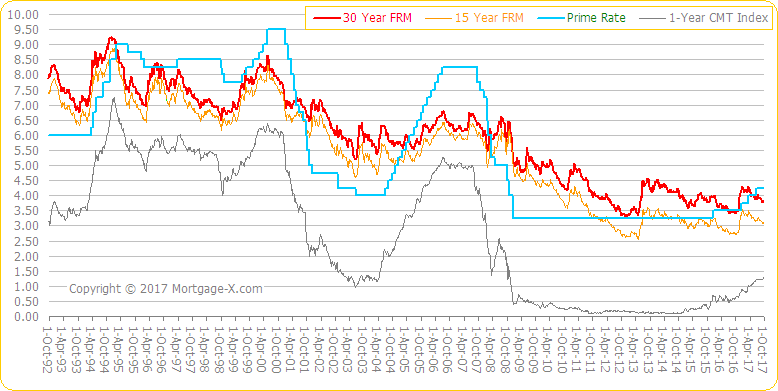|
Nam Taf posted:Why are ARM loans so feared in the US? Is it because of their systemic misuse and lack of education of the consumer? I'm trying to work it out, because here (Australia) they're the most common sort of loan and everyone just 'gets' them. Can you even get a 30 year fixed mortgage in Australia? Everyone might get ARMs because there is no alternative. Even the fixed loans there may only be for 5 years or so (or a normal ARM in the US) Being able to guarantee your payment (apart from taxes etc) will never change is rather awesome I think. Probably unsustainable too without massive govt intervention and insurance but Australia has its own mortgage problems. sanchez fucked around with this message at 15:03 on Jun 5, 2011 |
|
|
|

|
| # ? May 29, 2024 20:41 |
|
I couldn't even buy a house if I wanted to. I live in Canada and the province/city I live in is booming and is apparently one of Canada's fastest growing cities. Your average bungalow costs $200,000 here. No thanks!
|
|
|
|
With UrbanFarmer's situation I'd be tempted to just save up 50k over the next 6 months or so and buy for cash. But that being said, if you think you need a loan and can pay it off extremely early then an ARM is a great choice. It's the type of loan I got. I wanted to pay it off early (between 7 and 10 years) so I got a 7/1 ARM back in '03. Here's how a 7/1 ARM works. During the first 7 years it acts just like a fixed 30 year mortgage except with a lower rate. After 7 years it adjusts every year and re-amortizes over the remaining term of the loan. In other words, the first time it adjusts, the principle owed is amortized over 23 years, the 2nd time 22 years, etc. This means your minimum monthly payment will go down, if you've payed down enough of the balance with extra payments, even if interest rates rise. For instance, my loan payment for the first 7 years was $800. After making many pre-payments over those 7 years I knocked down the loan balance quite a bit, so when it finally adjusted last year my payment went down to $200. I still pay extra because I want to get it payed off early, but $200 is the minimum I have to come up with each month. For paying off early, I like the ARM over the 15 year fixed because the rate is lower and the minimum monthly payment is lower. The risk of rising interest rates only really matters if you can't afford to pay off early. Just make sure your loan includes no prepayment penalties! The reason people say ARMs are bad is most Americans, sadly, won't be able to pay off the loan early because they want to live in more house than they can afford.
|
|
|
|
sanchez posted:Can you even get a 30 year fixed mortgage in Australia? Everyone might get ARMs because there is no alternative. Even the fixed loans there may only be for 5 years or so (or a normal ARM in the US. Of the big 4 banks here, 3 offer up to 10 years fixed and 1 offers a 15 year fixed. You can of course fix it again at that point. So I guess it's not quite a 30 year fixed but it's not far off. You may find a 30 year fixed at some other smaller lender but the 4 majors here certainly offer almost the same thing. Our mortgage problems are that housing is on average 6x the average salary. They're hellishly unaffordable. Also standard variable rates currently sit at about 7-7.25%. In comparison, the 15 year fixed for $300k is 8.24%. Nam Taf fucked around with this message at 17:27 on Jun 5, 2011 |
|
|
|
Nam Taf posted:Of the big 4 banks here, 3 offer up to 10 years fixed and 1 offers a 15 year fixed. You can of course fix it again at that point. So I guess it's not quite a 30 year fixed but it's not far off. You may find a 30 year fixed at some other smaller lender but the 4 majors here certainly offer almost the same thing. Then I suspect that ARM's are popular there for the same reason as they were in the US, people can't afford payments on a higher interest rate fixed mortgage as houses are freakishly expensive. The rate gap between fixed and floating (8% vs 7%?) actually seems smaller than the US, which should mean the fixed option makes sense. 1% on a 600k+ mortgage is real money though, probably enough to break some people.
|
|
|
|
The US has seen very high base interest rates in the past, which is something we keep in mind when buyers go for a 30-year fixed rate. The 30-year fixed rate mortgage is still the most common type, and essentially every lender offers such a rate. The FED sets the "prime" rate (which is actually the overnight rate offered to major banks borrowing from the FED), and virtually all variable rates are based on Prime plus some premium. The FED has kept the Prime rate at essentially zero since the end of 2008, and it had been plunging since the fall of 2007 (between fall 2007 and the end of 2008 it dropped from 5% to basically 0%). This was all to try to stimulate spending to recover the economy. But during economic expansion, the FED raises rates to try to prevent inflation (by encouraging saving). In 1994, the prime rate peaked at over 7%, putting the national average for 30-year fixed loans at over 9%. (source) If rates can go from 9%+ to less than 5% in the span of 17 years, they can certainly do the opposite. Taking a 30-year fixed rate loan today at or just below 5%, compared to a 5/1 ARM with an intro rate of, say, 3.825%, is a pretty awesome hedge against that kind of increase, if you're really going to be paying your loan for 30 years. Australia's situation seems to have been wildly different. My jaw drops when I see that statistic: for 60 years the average variable home loan interest rate has been nearly 9%. It seems like Australians basically accept that home loans will be expensive and will fluctuate. My guess is that Aussie banks do not have the kind of access to financial markets to allow them to create and sell cheap fixed-rate 30-year mortgages; with high prime rates from Aussie's version of the FED, they insist on variable-rate loans because it's the only way they can ensure a profit, since they have to actually keep the mortgages they offer on the books (rather than securitizing them). But that's just a guess. Nam Taf posted:Of the big 4 banks here, 3 offer up to 10 years fixed and 1 offers a 15 year fixed. You can of course fix it again at that point. So I guess it's not quite a 30 year fixed but it's not far off. No, that's wildly different. Think about it: if you have to re-finance after 15 years to re-fix your loan, you must accept whatever the going rate is at that time. So, if you intend to pay for 30 years (e.g., you are not going to resell), you must accept up front the risk that rates will not be higher 15 years from now. If they are higher, you will pay more. Whereas all buyers are able to take advantage of falling interest rates as long as they have positive equity, because you can always re-finance into a lower interest fixed-rate loan. So the Aussie situation effectively prevents buyers from shielding themselves from future interest-rate risk when getting into a 30-year mortgage, period. Of course I agree it's still not as bad as if there were no fixed-rate mortgages available at all - and if you can afford to pay off a loan in 15 or 20 years, it's not bad anyway (your principal remaining on the loan will be small when the fixed-rate ends so the fluctuating interest rate won't matter as much). Leperflesh fucked around with this message at 18:15 on Jun 5, 2011 |
|
|
|
Leperflesh posted:The US has seen very high base interest rates in the past, which is something we keep in mind when buyers go for a 30-year fixed rate. The 30-year fixed rate mortgage is still the most common type, and essentially every lender offers such a rate. Just to clarify, you're confusing prime rate with fed funds rate. The Fed does not set the prime rate, it is the 'prime rate' that each bank sets themselves. Prime is currently at 3.25 as of close on Friday.
|
|
|
|
The Prime is published in the wall street journal, so I don't see how it can be set by individual banks. And, isn't it always the fed. funds discount rate +3%? If it is, then the FED is effectively setting the prime rate when they set the fed. funds discount rate. However I am remembering from economics class from when I was in college in the mid-90s so my brain might be rusty. e. Nope, you're right: WSJ prime is based on a survey of the 30 largest banks, and it changes when at least three quarters (23 or more) change their rate. So it is technically a consensus rate. In practice, though, I believe it always or nearly-always operates as a function of the fed. funds discount rate, right? Leperflesh fucked around with this message at 18:55 on Jun 5, 2011 |
|
|
|
Leperflesh posted:The Prime is published in the wall street journal, so I don't see how it can be set by individual banks. Just as mortgage rates are a function of the ten-year bond. It's all linked and related, but not 'set' by one or the other. You were spot on, just had some of the terms confused. The main point is all that matters. The Fed controls through those mechanisms that flow through the general public.
|
|
|
|
Nam Taf posted:Why are ARM loans so feared in the US? Is it because of their systemic misuse and lack of education of the consumer? I'm trying to work it out, because here (Australia) they're the most common sort of loan and everyone just 'gets' them. So while an ARM itself may be a perfectly reasonable option for a lot of borrowers and cheaper in the short term (though I'd have a hard time saying it would beat the prospect of getting a 4.5% fixed loan for 30 years), many people used it to get mortgages they clearly couldn't afford unless they were literally paying less per month than the interest accruing, and banking on the "guaranteed" equity increase to try and refinance later on down the line or sell outright.
|
|
|
|
I've been house shopping for about 3 weeks now, but starting to get cold feet about this. I could use some advice. My situation: 31 years old, no spouse or kids (don't plan on having either). Currently living in a cheap rear end 1 BR apartment. I work from home, and although my job is stable, I don't make much for my field. Financial stuff:
Why I want to buy: I don't know if I can stand living in lovely one bedroom apartments anymore. I'm currently paying $810/month. To live in an apartment that I would consider acceptable (i.e., not soul-crushing), I would end up paying about $1100-$1200/month. I understand that renting is not "throwing money away," but once I start paying over $1100/month, I think buying may be a better choice, especially at this point in my life. I have a stable, salaried job that I've worked for about the past 7 years. They don't pay as much as I deserve, but I love the job and the people. I also get to work from home, which is worth quite a bit in my book. The problem is, when you work from home in a tiny 1 BR apartment, you essentially never leave the loving office. This is starting to wear on me pretty bad. In my price range, I can afford a 1.5 story place with a nice, separate main floor office, upstairs master BR, and finished lower level entertainment room; that separation of work, sleep, and relaxation areas is my primary motivator for buying right now. Also, I'm starting to feel that I need to anchor myself, stop drifting from apartment to apartment, and finally put down roots somewhere in a quiet neighborhood. Reasons not to buy: I am not handy at all. Anything but the simplest of repairs would probably have to be done by a third party or maybe some help from my parents if I'm lucky. Also, everything else in this thread. --- So that's it. I'm still leaning towards buying as a good idea. Not as an investment, but as a place to live and hopefully recover some sanity. I'll have money set aside for most repairs, and a source of funding if things really go south like the roof caving in. Thoughts? Advice? A few weeks ago, I was sure I was ready to buy, but after reading this thread, my resolve has started to weaken. 
|
|
|
|
Clint Howard posted:I've been house shopping for about 3 weeks now, but starting to get cold feet about this. I could use some advice. If you have confidence that you won't be leaving your area or be expanding your household, then by all means, go ahead and look into purchasing.
|
|
|
|
Shipon posted:Look around at the average property tax rates in your neighborhood. At 4.5% interest, you're looking at $990 for principal and interest alone on the 30 year fixed if you put 55k down, but don't forget the property tax and homeowner's insurance to go along with that. To be generous, lets say property tax is at 1%, meaning you'll be paying another ~$210 a month on top of that. Granted, you're single and as such, you'll be getting much better of a break on your tax return when you deduct your mortgage interest than most would. $50k a year income sounds a bit too low for a house of that price, and lenders might not exactly be so happy about that income (31% of gross income going to PITI would put you right on that borderline). Property taxes in the neighborhood are closer to 1.4%, as far as I can tell. Also, the 250k figure was just the highest amount I was pre-approved for. I'm shopping closer to the $210k-230k range. Let's say I find something for $220k. I'd be paying around $260/month for taxes. When I worked it out with my mortgage consultant, we came up with around $1250/month PITI for those numbers, estimating insurance amount. That's about 30% of gross income for me, which I would be comfortable with, as I have no debts, stable employment, and no intention of having a family. $50k/year income is definitely a bit low for the places I'm looking at, but I was able to compensate somewhat with good credit and a 20%+ down payment. I was pre-approved by two different lenders for a loan up to $200k (sale price $250k). Should I assume that "pre-approval" is pretty much bullshit until I actually apply for the loan?
|
|
|
|
Clint Howard posted:Property taxes in the neighborhood are closer to 1.4%, as far as I can tell. Also, the 250k figure was just the highest amount I was pre-approved for. I'm shopping closer to the $210k-230k range. Let's say I find something for $220k. I'd be paying around $260/month for taxes. When I worked it out with my mortgage consultant, we came up with around $1250/month PITI for those numbers, estimating insurance amount. That's about 30% of gross income for me, which I would be comfortable with, as I have no debts, stable employment, and no intention of having a family.
|
|
|
|
So If you were to pay off an ARM over 30 years, you would probably pay less over the initial period when you lock in a low rate, and then pay more over the course of the rest of the loan. You could also, in theory, after that initial period, refinance into a fixed loan if you have the equity, locking in a lower rate than your fluctuating rate, and (if you refinance to 30 years for sure, and maybe even if you refinance into a 15 year, depending on rates) a lower payment than you had before, though it will be over 30 years instead of the 25-23 years you had left on your ARM. Or you could do like nelson does, get a low rate at the front, prepay the poo poo out of it, and then have tiny minimum payments every year, just in case you get in a short term bind. Am I leaving anything out/wrong about that?
|
|
|
|
I'd say there's nothing wrong with considering an ARM unless you follow the idea with "because if I get one, I can afford the house!" Sadly, that's what everyone did for a good long while and much like comets they are now seen as bad omens by most of America.
|
|
|
|
FISHMANPET posted:You could also, in theory, after that initial period, refinance into a fixed loan if you have the equity, locking in a lower rate than your fluctuating rate There are two preconditions (actually three): -if you have the equity -if interest rates are not jumping so high that you cannot get a fixed rate lower than your current fluctuating (but capped/year) rate -(if your credit is still good) To be clear about the second point: suppose during the first five years of locked rate (of a 5/1 ARM), the economy heated up and mortgage interest rates went up a lot. When your rate unlocks, suppose it's still capped at no more than 1% increase per year. You could then be in a situation where your current fluctuating rate, despite going up by 1% this year from your old very low capped rate, is still lower than the going fixed-rate mortgage. You can refinance, but doing so will increase your mortgage payments today, although it will still be better for you in a couple of years (assuming rates continue to climb). Refinancing would still perhaps be a good idea, but after a few years, you might well be in a worse situation than if you'd gone with a fixed-rate loan in the first place. The third point is generally considered to be "in your control", but I think it's still a risk worth including in your considerations. Refinancing is getting a new mortgage and I believe if your credit is unexpectedly terrible, you could find yourself having trouble refinancing.
|
|
|
|
Shipon posted:Yes, the "pre-approval" is usually bullshit. $220k sounds like a good target and you'll be able to put down straight up 25% on that property with your target downpayment. Given that, you sound like you're able to afford it so by all means, go ahead. Just be aware of all of the incidentals that come with owning a house. Yeah, the incidentals are giving me the most worries at this point. The place I've got my eye on right now is the most move-in ready of the places I've seen, but I've learned from this thread that "move-in ready" means everything will fall apart within a month of moving in. Anyway, thanks for boosting my confidence a bit, at least on the financial side of things.
|
|
|
|
Clint Howard posted:I don't know if I can stand living in lovely one bedroom apartments anymore... This is starting to wear on me pretty bad... separation of work, sleep, and relaxation areas is my primary motivator for buying right now. I'll just add that this is pretty much why I decided to buy and although I've had some unfortunate and costly things come up with the house, I think it's a drat good reason to buy I was sharing a 2 bedroom apartment with a roommate and after 3 years I was starting to lose my mind. Now I have a 2 floor, 3 bedroom town-home all to myself. Just having some loving room to spread out is worth it alone. And, in my case, being able to do whatever I want (within reason) at anytime of the day without worrying about a roommate sleeping or something is the tits. My biggest mistake was not having enough of an emergency fund after buying the house, because I pretty much put my entire savings into the down payment. I kept $4,000 on hand after buying the townhome and then poo poo started breaking right off the bat. Within 2 months of owning I've had to replace appliances, my central air conditioning unit, the garage door opener, plumbing issues, and all kinds of little things here and there that I didn't anticipate. I now have less than $1,000 to my name and I'm living paycheck to paycheck trying to make ends meet. If it wasn't for help from my parents, I'd have gone bankrupt within those two months. Keeping $15k on hand is a lot better than where I was, but plan on EVERYTHING going wrong when you buy a place.
|
|
|
|
FISHMANPET posted:Or you could do like nelson does, get a low rate at the front, prepay the poo poo out of it, and then have tiny minimum payments every year, just in case you get in a short term bind. If you can prepay, then yes. But the biggest problem with the whole ARM issue is that it's just like the rest of American culture. We shop payments, not cost, and start at the biggest payment we can afford without doing any math beyond that. That's a huge mistake. Say you do this, you do an ARM and pay on it for 5 years without paying ahead, then rates threaten to go up so you refinance into a 30 year. Your amortization clock starts over, and 5 years of interest heavy payments go right into the toilet. So you're basically speculating on interest rates going up, but they have to go up a fairly large amount for it to cost you more than 5 years of front loaded interest. I just did this myself, and it was only after I signed the papers that I started to do the math. Interest rates will have to go up several points because I spent about 45k over 4 years on interest, and if rates don't go up at all, the new mortgage will cost me about $27k more than if I just stuck with my ARM. In effect, I got a 34 year mortgage that reset the amortization at year 4. The whole "just refinance if rates go up" is another piece of "conventional wisdom" that turns out most of the time to be a loving lie designed to sucker you in to a bad decision.
|
|
|
|
Cmdr. Shepard posted:Keeping $15k on hand is a lot better than where I was, but plan on EVERYTHING going wrong when you buy a place. Yeah, I'd be more comfortable with $20k+ on hand after down payment and closing costs. But I live pretty frugally, and I've budgeted things out to save additional money if/when I decide to buy.
|
|
|
|
Clint Howard posted:My situation: 31 years old, no spouse or kids (don't plan on having either). Currently living in a cheap rear end 1 BR apartment. I work from home, and although my job is stable, I don't make much for my field. Forget buying a house. Go find a better job (anywhere at all, don't be afraid of moving since you don't have a Mrs. Clint Howard or kids) and then start thinking about your living situation. Take some risks.
|
|
|
|
I just realized it'd be totally possible for an ARM to reset to a lower interest rate if you had bought during a time of high interest rates (not in the past 12 years) and a recession happened with the Fed cutting interest rates a bunch to stir the economy.
|
|
|
|
necrobobsledder posted:I just realized it'd be totally possible for an ARM to reset to a lower interest rate if you had bought during a time of high interest rates (not in the past 12 years) and a recession happened with the Fed cutting interest rates a bunch to stir the economy.
|
|
|
|
I mentioned this on the other page, I have a coworker paying something in the low 3%s right now.
|
|
|
|
TraderStav posted:I mentioned this on the other page, I have a coworker paying something in the low 3%s right now. I could have gotten 3.5% on a 15 year, but ended up going with a 30 year @ 4.25% instead.
|
|
|
|
FISHMANPET posted:You could also, in theory, after that initial period, refinance into a fixed loan if you have the equity, locking in a lower rate than your fluctuating rate This is false. A new fixed rate will (almost) always be higher than the adjustable rate at the time the loan is available. If your ARM rate is 5% the fixed would be something like 6.25% nelson fucked around with this message at 02:52 on Jun 7, 2011 |
|
|
|
necrobobsledder posted:I just realized it'd be totally possible for an ARM to reset to a lower interest rate if you had bought during a time of high interest rates (not in the past 12 years) and a recession happened with the Fed cutting interest rates a bunch to stir the economy. Pretty much everyone who still has an ARM has a lower rate today. Historical low. It's much more likely to rise in the future rather than go down even lower though. 
|
|
|
|
I looked at ARMs since I have no intention of living in my first home for 15+ years. With the traditional 5 year ARM (5/2/5) and rates at all time lows there is a very good chance that your rate will rest higher in five years - even up to 8% (if the initial ARM rate is in the low 3s). Basically you are betting that you will sell the home (or pay it off I guess) before you lose all the money you saved by going with the ARM initially. The break even point for the worse case scenario was around 7-8 years. The FHA 5 year ARM has much better terms (1/1/5), but the additional amount of PMI over a conventional ARM wiped out any potential savings. Everyone I talked to said I'd be nuts not to lock in a sub 5% rate for 30 years, especially since I have deductions that all my mortgage interest is deductible.
|
|
|
|
Realjones posted:Everyone I talked to said I'd be nuts not to lock in a sub 5% rate for 30 years, especially since I have deductions that all my mortgage interest is deductible. Maybe I'm wrong here, but isn't having money in your pocket (or paid off as principal) much better than paying it out as interest and getting a measly 28% back on your tax returns?
|
|
|
|
LloydDobler posted:Say you do this, you do an ARM and pay on it for 5 years without paying ahead, then rates threaten to go up so you refinance into a 30 year. Your amortization clock starts over, and 5 years of interest heavy payments go right into the toilet. So you're basically speculating on interest rates going up, but they have to go up a fairly large amount for it to cost you more than 5 years of front loaded interest. Looking at the sum of payments on a 35 year ARM-then-fixed scenario and comparing it to a plain 30 year fixed scenario is not really informative. You need to calculate the NPV of both scenarios for an accurate measure of their relative cost. If you're still mentally stuck on the change in term, you can always increase your payment to simulate a shorter amortization period. If you get an ARM you're betting on rates going down or staying the same until you dispose of the property. Rates going up do not make ARMs more attractive, they make FRMs more appealing.
|
|
|
|
Nocheez posted:Maybe I'm wrong here, but isn't having money in your pocket (or paid off as principal) much better than paying it out as interest and getting a measly 28% back on your tax returns? Not to mention that the only benefit is over whatever your standard deductions would normally be. Unless you have a monster mortgage, or a very high interest rate, that's likely to either be less than the standard or only a little bit over. The tax deduction is much touted and not all that realistically important. Now take someone like me that bought a second home, that's a lot of deductible interest!
|
|
|
|
Clint Howard posted:words... Not getting into a big financial breakdown of the upsides and downsides of this, the cost/hassle/time of owning a house vs. another $300/month to get a nice place is a pretty easy question for me. Just buck up and move into a nicer apartment or perhaps find a roommate and share a house. Maybe start going back into work? I think you're feeling isolated because of your work situation, not your housing situation. I also find the not wanting a spouse/kid kinda weird, and if that does change you may want to be able to move without huge expense.
|
|
|
|
SlapActionJackson posted:Looking at the sum of payments on a 35 year ARM-then-fixed scenario and comparing it to a plain 30 year fixed scenario is not really informative. You need to calculate the NPV of both scenarios for an accurate measure of their relative cost. Correct, but that's not how they're marketed, and suckers like the former me don't know that. I was sold an ARM with "If you get an ARM your payment will be lower and you can get a more expensive house, then if rates go up or you make more money just refinance it then!" Then I got "hey rates are going to go up, dump that ARM and refi into a fixed!" Then I did the math, albeit on my situation specifically. Fortunately I was at least smart enough to buy way less house than I qualified for, so it hasn't been a hardship and I weathered a 7 month unemployment back in 2009 without losing everything I own.
|
|
|
|
TraderStav posted:Not to mention that the only benefit is over whatever your standard deductions would normally be. Unless you have a monster mortgage, or a very high interest rate, that's likely to either be less than the standard or only a little bit over. I have enough deductions in state income taxes and other stuff that I'm over the standard before considering property taxes and mortgage interest. If all of your mortgage interest is deductible, than the spread between a 5 year ARM and 30 year is smaller, is it not? For example if a 30 is 4.5% and ARM is 3%, the spread is 1.5%. If you're in the 28% bracket and it's all deductible the after tax spread is down around 1.1%. Certainly the ARM is less interest paid, but you have to accept that the rate may eventually jump (it won't be dropping with the funds rate already at 0%), which can very quickly erase those gains made in the first years. The belief that people could easily refinance out of ARMs was a major issue in 2008-2009 (granted many of them were option ARMS, but the concept is the same).
|
|
|
|
Folks need to be real careful with ARMs. There are many people who bought a house with no intention to live in it past 5 years. The value of their properties dropped to the point where they owe more than it's worth, and cannot refinance. When rates go up, housing prices will go down even more and they will be stuck.
|
|
|
|
So I put in an offer today for a short sale. It's about 50k less then almost all the compared prices around the same area. The first sold in 2007 for almost 250k. I offered 95k. Now after inspection and assuming the lender goes ahead and agrees to the sale terms, is there any reason I shouldn't or legally couldn't offer to let the woman selling it rent the property from me at less then her current mortgage price? I'm guessing her payments are around 1500-1600 dollars a month after taxes and HOA dues, but I'd be okay letting her stay for 1k a month or so.
|
|
|
|
Themagicmoogle posted:So I put in an offer today for a short sale. It's about 50k less then almost all the compared prices around the same area. The first sold in 2007 for almost 250k. I offered 95k. What's the property appraised at now? If you're offering $95k on a home that's still worth in the low-mid $200s, I don't know how inclined a lender would be to approve that. Typically, the sale has to be an arms-length transaction. In other words, as far as I know, no family members, etc. If you don't have any relationship with the current owner other than looking to buy the home, I don't think there's anything forbidding renting to her after-the-fact.
|
|
|
|
Themagicmoogle posted:So I put in an offer today for a short sale. It's about 50k less then almost all the compared prices around the same area. The first sold in 2007 for almost 250k. I offered 95k.
|
|
|
|

|
| # ? May 29, 2024 20:41 |
|
Stimulus posted:What's the property appraised at now? If you're offering $95k on a home that's still worth in the low-mid $200s, A house that sold for 250 in 07 is not worth low-mid 200's still. 95 seems on the cheap side, but I guess it could be a lousy house in a terrible location that has been trashed.
|
|
|



























